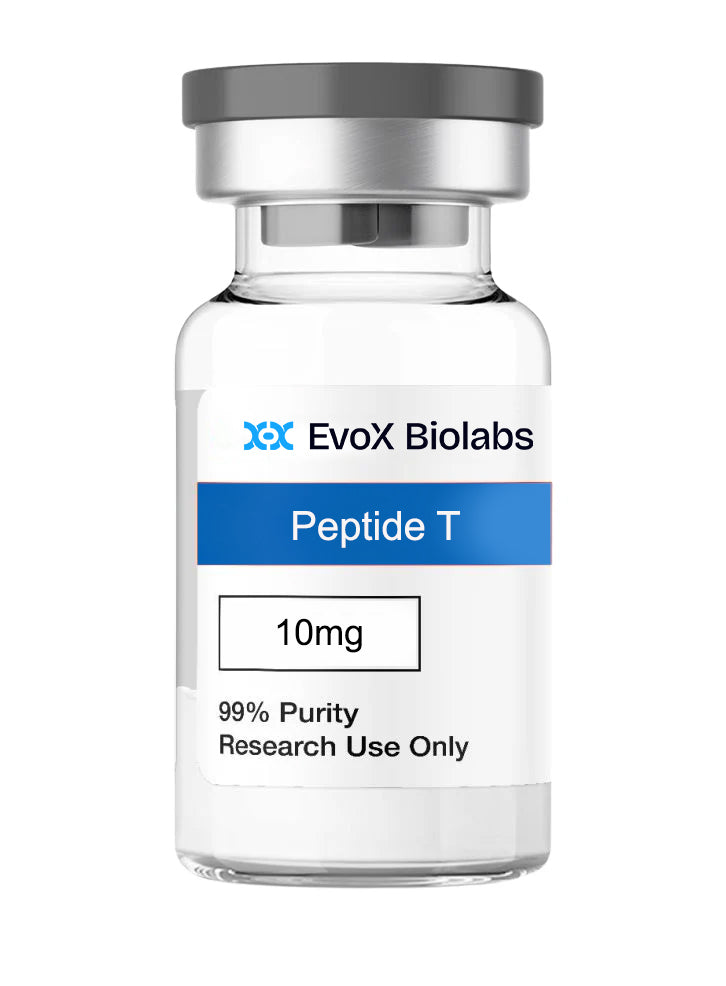EvoX Biolabs Research Peptides
Peptide T
Peptide T
Couldn't load pickup availability
Peptide T is a synthetic peptide consisting of an eight-amino-acid sequence (ASTTTNYT), derived from the gp120 protein of the human immunodeficiency virus (HIV). Initially identified in the 1980s, it was developed to block the interaction between gp120 and cellular receptors, such as CCR5, which HIV uses to infect cells. Its therapeutic potential has been explored primarily in HIV-related conditions but also in other inflammatory and neurological disorders.
Potential Research Applications
Peptide T has been studied in various medical research areas, including:
-
HIV and Related Dementia:
-
Peptide T has been investigated for its ability to reduce neurotoxicity caused by gp120, which contributes to cognitive impairment in HIV/AIDS patients. Early studies suggested improvements in cognitive function and reduced inflammation in the central nervous system.
-
-
Inflammatory Conditions:
-
Due to its anti-inflammatory properties, Peptide T has been explored in conditions such as psoriasis, with some studies examining its topical application to alleviate inflammatory skin symptoms.
-
-
Neurodegenerative Diseases:
-
Preliminary research indicates that Peptide T may have potential in conditions like Alzheimer’s disease, owing to its ability to protect neurons and reduce brain inflammation.
-
-
Other Applications:
-
Exploratory studies have investigated Peptide T in chronic pain, chronic fatigue syndrome, and other inflammatory conditions, though data remain limited and inconclusive.
-
Mechanism of Action
Peptide T primarily works by:
-
Inhibiting the binding of HIV’s gp120 to chemokine receptors (e.g., CCR5) on cells, reducing viral entry and associated cellular damage.
-
Modulating inflammatory responses by decreasing the release of pro-inflammatory cytokines.
-
Protecting neurons from toxicity, which may be beneficial in neurological conditions.
Current Status and Limitations
While Peptide T showed promise in early clinical trials, particularly in the 1980s and 1990s, subsequent studies yielded mixed results. Factors such as limited large-scale efficacy and a lack of robust clinical trials have prevented its widespread approval by regulatory agencies, such as the FDA or equivalent bodies. Currently, Peptide T is primarily used in research settings or experimental formulations, with limited clinical application.
Key Considerations:
-
Lack of Regulatory Approval: Peptide T is not widely recognized as a standard treatment for any medical condition.
-
Ongoing Research: Further studies may clarify its potential in specific applications, but more data are needed.
-
Medical Oversight: Any use of Peptide T, even in experimental contexts, should be supervised by qualified healthcare professionals.
Why Research Peptide T?
Peptide T remains of interest to researchers due to its unique mechanism of action and potential in areas such as neuroprotection and inflammation modulation. For companies or platforms looking to explore or market related products, it is critical to emphasize the experimental nature of the peptide and the need for further scientific evidence.
Share




